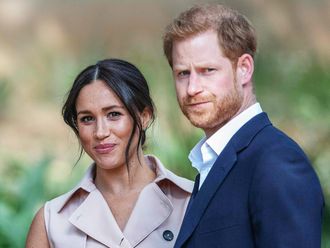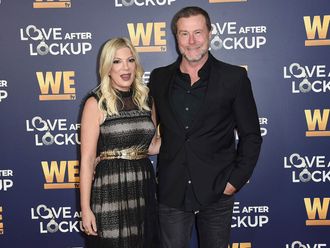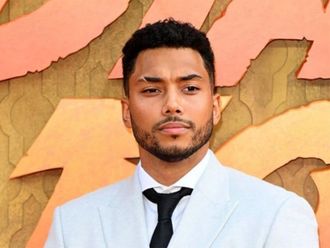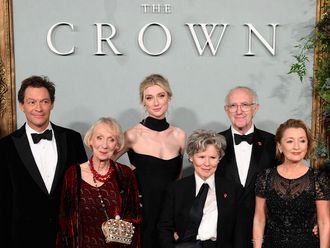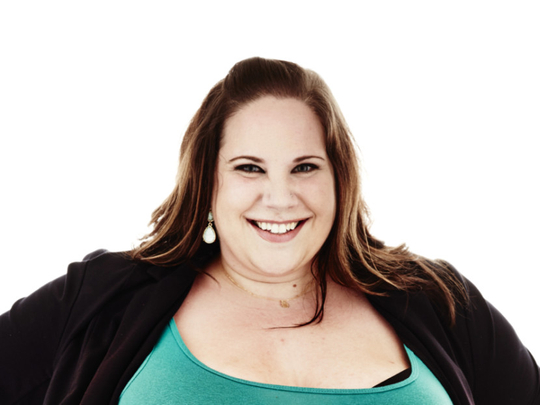
People often question whether the reality show documenting the lives of Kim Kardashian West and her family is worth watching. Well, it’s fun, glam and a bit mad, but is it going to teach you anything? Is it going to have a positive impact on women’s lives?
For that, you’d have to watch Whitney Thore’s incredible story, which has now taken her to her third season of her show, My Big Fat Fabulous Life.
Her story can’t be told enough times: Now 32, Thore went from being an active, dance-obsessed 18-year-old to a depressed, obese university student in a matter of months. Her weight ballooned by more than 100kg, and, she tells tabloid!, “I was two different people”.
“In high school I was prom queen and a year later I was fat. People treated me as a different person. When my body changed, people treated me very poorly. People were cruel to me, and assumed I am really lazy or stupid, or maybe I’d never had a boyfriend. I believed that for a long time.”
My Big Fat Fabulous Life, which starts its third season on TLC on September 9 at 7.20pm, has tracked Thore’s life since she became a viral hit when the radio station she worked at posted a video of her dancing. It’s seen the struggles she’s faced, emotionally and health-wise, as she deals with the massive changes her body has gone through — and the perceptions that come her way because of it.
Perhaps what’s most astonishing is that her weight gain was initially caused by a syndrome that affects one in ten women in the US, and yet is often undiagnosed: Polycystic ovarian syndrome, or PCOS.
“There is very little awareness about it. Even now I have to travel out of town to go to a doctor who I feel is really well versed. Some of the early symptoms are absent periods — that was my first symptom,” says Thore. “I never had a period and even in my early 20s, doctors would say it’s normal. Turns out it’s not normal. But at the time it was my only symptom. I know so many people have reached out and said they were diagnosed after watching the show and they had never heard of it.”
Educating viewers on PCOS is only part of Thore’s mission, however: She has a campaign called Nobody Shame, and travels around the US speaking about body positivity and calling for an end to “fat-shaming”, which she says is pervasive and has the same effects as racism and sexism. Her body-positivity movement has drawn frequent accusations that she’s promoting obesity, however.
“I think this is pretty silly. I remember once I was doing a speech with about 700 people, and I asked who watched the show, and they raised their hands. Then I said, ‘how many of you have considered gaining weight to be like me’, and of course, no one kept their hand raised. I don’t think people are looking at me and thinking “I want to look like her”.
“What I know is hating your body will never get you anywhere faster than loving it will. There’s nothing wrong with wanting to lose wight or pursue health, but what I am about and what Nobody Shame is about, is simply loving yourself first, and then everything else falling in place after that. When I was wanting to be thin and that was all I could focus on, I hated myself, I didn’t dance, I didn’t take care of myself. Now I do and all those things are a lot easier.”
She’s also adamant in encouraging people to talk about weight with their friends and family. When Thore first gained weight, nobody discussed it, and she says that prevented her from taking action. “That’s interesting and important to think about. Being fat is such a taboo that even though something was physically wrong with me, and I would later be diagnosed with PCOS, nobody wanted to talk about it. I wish someone had talked to me about it and encouraged me to go to the doctor and face it.”
In a phone interview, Thore spoke candidly about the constraints of the plus-size movement, romance, health goals and the new season of her show. Excerpts:
Season three sounds like it’s going to be quite different.
It’s definitely a little bit more dramatic, there is a bit more heavy stuff in it, not only in my relationship but also in my health. Some scary things happen, and episode one is a little bit jarring I think, with a hospital visit. I think it’s a little bit more serious and more intimate, and it was a lot harder for me to watch on TV.
Do you have a weight-loss or health goal, and how do you feel when people ask you about losing weight?
I don’t have a weight-loss goal, I don’t think that’s something really important. We connect healthy with numbers too often, like BMI [body mass index] and this one-size-fits-all programme for weight loss. I do have health goals. I want to feed my body with nutritious food, I want to exercise every day, I want to get enough sleep, I want to manage my stress, I want to do all those things and when I do those, chances are it will result in some kind of weight loss, and that’s fine, I’m open to my body losing weight. But I think it’s kind of dangerous to put a weight-loss goal as a priority. That’s what I did and I had an eating disorder, I was miserable. I think that’s something most of us can relate to.
It can get frustrating, a lot of times people are open to it then they’ll be, ‘OK, but how many pounds have you lost’. It’s indicative of how we are obsessed with a number and what the scale says. I care about my blood pressure and things like that, but the number on the scale doesn’t define me. I’m just waiting for other people to catch up with that mentality. In the meantime, I’ll answer the questions.
What’s dating been like?
There are some real difficulties for women who are bigger, but it’s not what you think it is. I have never not had men interested in me. I think the issue is that a lot of men who are interested in bigger women tend to be embarrassed about it because it’s a bit of a taboo. I will encounter men who find me attractive or really like me but won’t want to date me because they are afraid of what other people will think. That can be very frustrating. But for me, I would never consider dating a man who was so weak that he was embarrassed to take me to his parents. I want bigger women to know that there are plenty of men out there who will love you and be attracted to you, and I know because I come into contact with them every day.
What changes are taking place in perceptions?
I do [think it’s getting better] but I also don’t know when I have children that it’s going to be gone. It’s going to be a long hard fight and this is the beginning. One thing I would like to see improved is I tend to see a lot of the focus on body positivity is geared toward plus-size modelling and fashion. That representation is important, but I want to move away from that, and encourage that all women are valid whether we are attractive or not. We are still caught in that ‘plus-size women can be beautiful’. We can be of course, but I am really fighting for the right not to be considered ... it’s a bigger issue of feminism.



